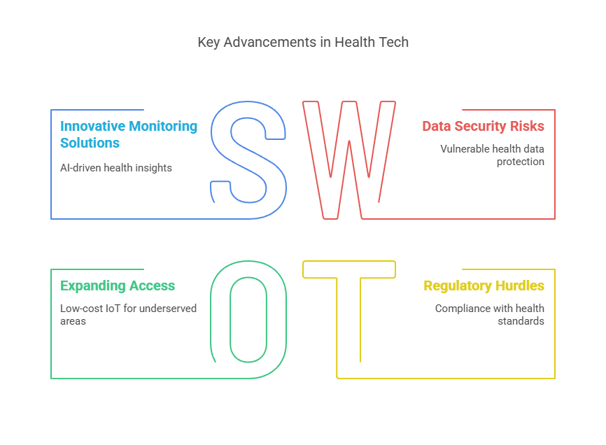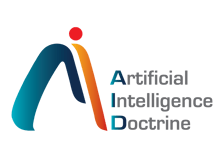Digital Health




The convergence of Artificial Intelligence (AI) and Internet of Things (IoT) technologies is transforming digital health, enabling real-time, remote patient monitoring with unprecedented precision. AI-driven IoT devices are empowering healthcare providers to deliver proactive, personalized care while improving outcomes and reducing costs.
Key Advancements
1. Wearable Health Monitors
Smartwatches & Patches: Devices like the Apple Watch and BioSticker continuously track vital signs (heart rate, SpO₂, ECG) and use AI to detect anomalies such as atrial fibrillation or sleep apnea.
Chronic Disease Management: IoT-enabled glucose monitors (e.g., Dexcom G7) combine AI to predict blood sugar trends and alert diabetic patients in real time.
2. Remote ICU & Hospital-at-Home
AI-Powered Dashboards: Hospitals use IoT sensors to monitor patients remotely, with AI analyzing data streams to predict sepsis or deterioration (e.g., Philips eICU).
Post-Op Recovery: Smart bandages with IoT sensors track wound healing, while AI assesses infection risks.
3. Elderly & Chronic Care
Fall Detection & Prevention: IoT wearables (e.g., CarePredict) use AI to detect falls and analyze gait patterns to prevent future incidents.
Medication Adherence: Smart pill dispensers (e.g., Hero Health) sync with AI platforms to remind patients and notify caregivers of missed doses.
4. Mental Health Monitoring
Emotional AI: IoT devices like the Spire Health Tag measure respiratory rates and stress levels, while AI provides personalized mindfulness recommendations.
Sleep Optimization: Smart beds (e.g., Withings Sleep Analyzer) track sleep cycles, and AI suggests interventions for disorders like insomnia.
Benefits
Early Intervention: AI detects subtle health changes before they become critical, reducing hospitalizations.
Personalized Care: Machine learning tailors recommendations based on individual patient data.
Scalability: IoT devices enable 24/7 monitoring for large populations, from rural clinics to urban hospitals.
Challenges
Data Security: Protecting sensitive health data transmitted across IoT networks is paramount.
Interoperability: Ensuring seamless integration between diverse devices and EHR systems remains a hurdle.
Regulatory Compliance: Meeting standards like HIPAA and FDA approvals for AI-IoT solutions.
Future Trends
5G & Edge AI: Faster data processing for real-time analytics in critical care.
Predictive Ecosystems: AI will correlate data from multiple IoT devices (e.g., smart homes + wearables) for holistic health insights.
Global Reach: Low-cost IoT sensors and AI will expand access to underserved regions.
AI-powered IoT is redefining patient monitoring, shifting healthcare from reactive to predictive models. As technology evolves, these innovations will democratize high-quality care, making it more accessible, efficient, and patient-centric.


The AI-driven IoT devices have revolutionized my health monitoring. Real-time insights have empowered me to manage my condition effectively. Highly recommend for personalized care!
John Doe

★★★★★
Get in touch


Get in touch
83 Watsonbrook Dr. Brampton, L6R 0R5, ON, Canada
contact@aidoctrine.com
Shahed Tower, 10 Floor, Mirgab, Kuwait city, Kuwait
